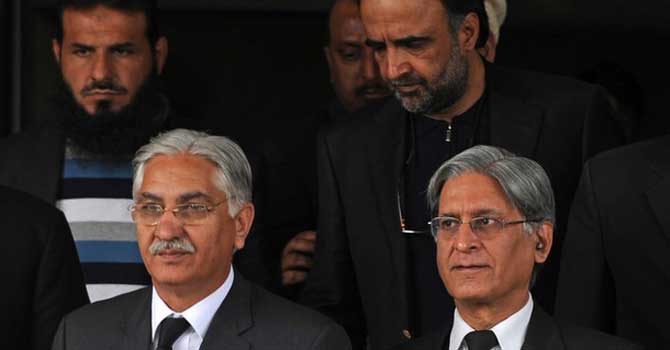
Since Monday, the media has been busy deciphering the statements issued by Chief of Army Staff General Ashfaq Parvez Kayani and Chief Justice Iftikhar Mohammad Chaudhry.
The usual explanations have been churned out: pessimists view the statements as a direct confrontation between the army and the judiciary, while optimists would like to believe that since both upheld the supremacy of the Constitution, it was a good omen for the country.
However, regardless of the perceived messages – whether they actually hit out at each other intentionally or it was a mere coincidence that they both spoke on the same day – the episode had one very obvious beneficiary: President Asif Ali Zardari and in turn his party, the Pakistan People’s Party (PPP).
For the better part of his stint since his election as president in September 2008, Mr Zardari has been perceived as the joint target of both the military leadership and superior judiciary of the country at one point or the other.
The events on Monday though seemed to have created a fissure between the judiciary and the military, which worked to his advantage by diverting attention from the growing distrust between the PPP, military and judiciary.
It was just in June this year that a Supreme Court-appointed judicial commission found former ambassador to the US, Mr Hussain Haqqani, handpicked by President Zardari, guilty of forwarding the controversial memo to the US military. General Kayani and ex-spymaster, General Shuja Pasha, had submitted their witnesses in the probe, which eventually led to the exit of Mr Haqqani from the ambassadorship.
Then of late there has been the dragged out saga of the Swiss letter with the judiciary. Despite the government’s claims that the sitting president enjoys constitutional immunity, the judiciary has consistently insisted that a letter be written to the Swiss authorities for reopening graft cases against President Zardari. In numerous other cases, the PPP-led government has been criticised for obstructing justice.
Earlier, the PPP fell out of favour with the army due to its stance after the May 2 Abbottabad raid. It was apparent to all that President Zardari and the military establishment were on two different pages: while the president hailed the attack in his piece that he wrote for the Washington Post, the GHQ criticised the government for media handling and letting it pan out by all and sundry for its ill-preparedness against the American SEAL team attack.
In such circumstances, the perceived disagreement between the superior judiciary and the military top brass has the governing PPP leadership out of the fray. The spotlight has been turned away from the ruling party, and very conveniently, the PPP is refusing to pick sides between the COAS and the CJ.
A senior PPP leader, while talking to Dawn, remarked: “I don’t know if there is a real or perceived conflict between the judiciary and military, the ensuing discussion in the media is going our way.”
“Throughout our tenure in the government since 2008 general elections, the PPP had been painted as the villain party that had refused to accept court orders, and put the national interest at stake by pitting itself against the military establishment. It’s a blessing in disguise that with general elections around the corner, such events are shaking off these ignominious tags from the party,” he added.
The PPP leader explained that the SC judgment on Air Marshal Asghar Khan’s case – in which the court vindicated the PPP’s stand that 1990 general elections were stolen by the then military establishment in connivance with the right wing Islami Jamhoori Ittehad – had buttressed the party’s case.
“And now with the latest episode of COAS and CJ statements, our leadership has been absolved of the blame of taking sides, because for some time it was being discussed in some section of the media as if the president is busy wooing military leadership for another presidential term. And lately some even accused us of warming up to the judiciary when the government agreed to write the letter to the Swiss government,” said the PPP leader.
With the elections around the corner, the nuances of every single statement and action would continue to be put under the microscope and analysed to no end. The right way of playing the game would be by sitting on the fence.











































